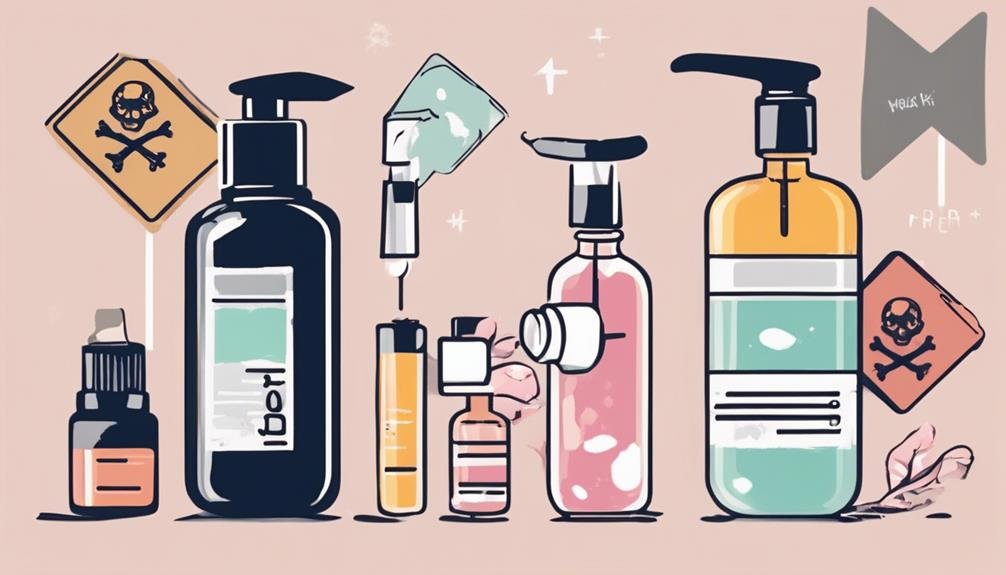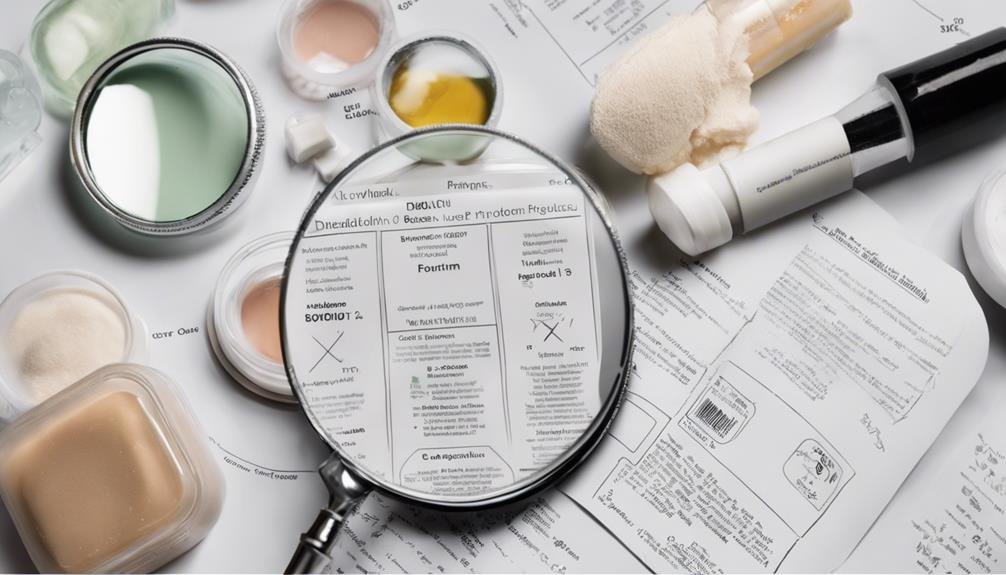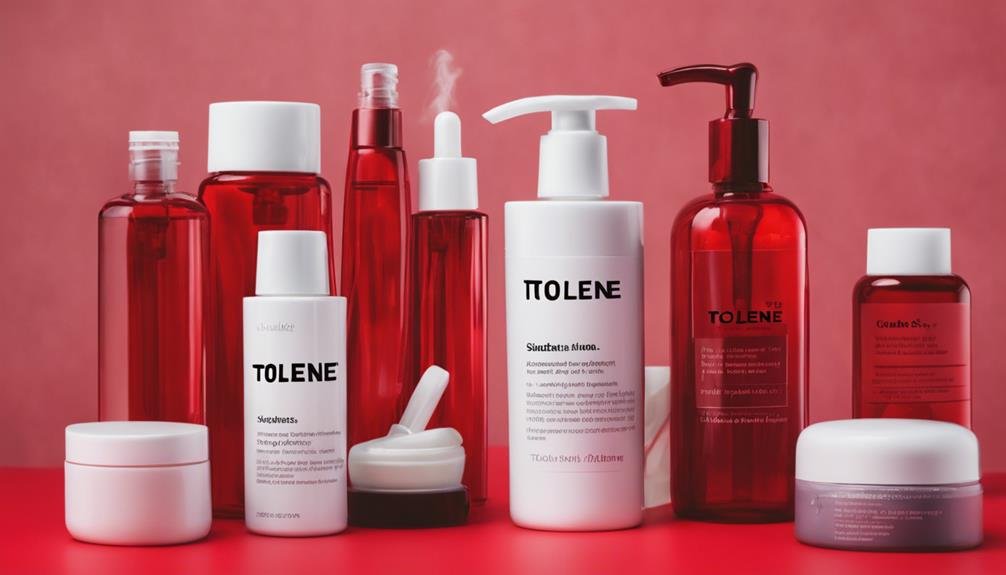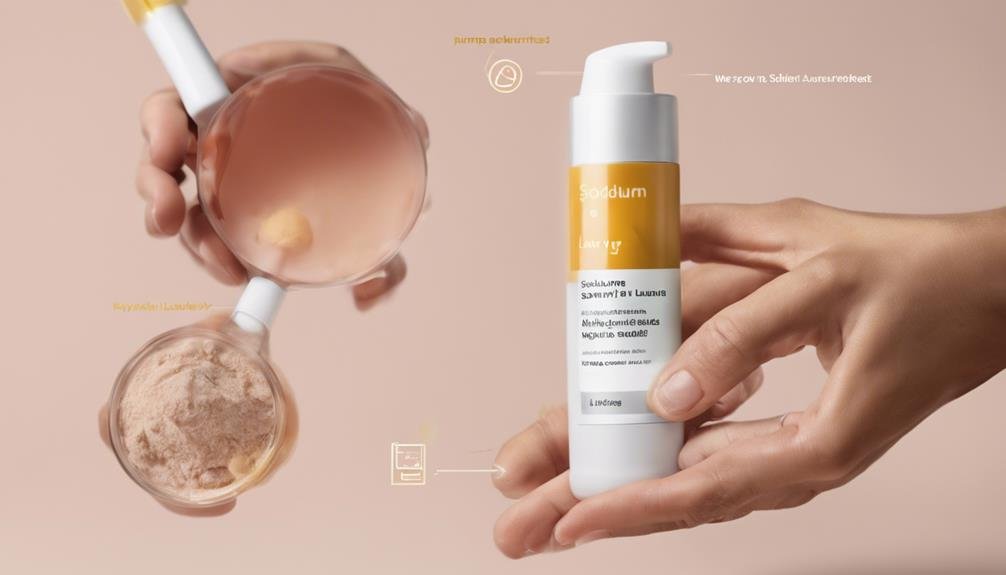You may not be aware that many common skincare products contain harmful ingredients that can negatively impact your skin and overall health. Some of these ingredients might surprise you. By avoiding substances like parabens, sulfates, phthalates, and synthetic fragrances, you can take steps towards a healthier skincare routine. But that's just the beginning. There are more ingredients to be cautious about, and understanding their effects is key to making informed choices for your skin's well-being.
Key Takeaways
- Avoid parabens due to estrogenic effects and links to breast cancer.
- Steer clear of sulfates for their skin-drying and irritating properties.
- Phthalates, known hormone disruptors, can cause skin irritation.
- Synthetic fragrances may trigger allergies and disrupt hormones.
- Formaldehyde in skincare products can irritate skin and pose cancer risks.
Parabens
When it comes to skincare, one of the ingredients you should be wary of is parabens. Parabens are commonly used as preservatives in cosmetic and personal care products to prevent the growth of bacteria and mold. However, research has shown that parabens can mimic estrogen in the body, potentially disrupting hormone function and leading to various health concerns. Studies have linked parabens to breast cancer, reproductive issues, and skin irritation. While the concentration of parabens in products is regulated, the cumulative exposure from multiple products can still pose a risk.
To avoid parabens, look for products labeled as "paraben-free" or check the ingredient list for common paraben names like methylparaben, propylparaben, ethylparaben, and butylparaben. Opt for natural and organic skincare products that use alternative preservatives like vitamin E, grapefruit seed extract, or rosemary extract. By being mindful of the ingredients in your skincare products and choosing paraben-free options, you can prioritize your health and well-being.
Sulfates
If you are conscious about the ingredients in your skincare products, one component to be cautious of is sulfates. Sulfates are commonly found in cleansers, shampoos, and body washes due to their ability to create a foamy lather. However, they can be harsh on the skin and hair, causing dryness, irritation, and even stripping away natural oils.
| Pros | Cons |
|---|---|
| Effective cleansers | Harsh on skin |
| Creates lather | Can cause dryness |
| Affordable | Irritating to some |
| Widely available | Strips natural oils |
When choosing skincare products, look for sulfate-free options to help maintain the health and hydration of your skin and hair. While sulfates are not harmful to everyone, individuals with sensitive skin or conditions like eczema may benefit from avoiding them. Opt for gentler alternatives that can cleanse without causing unnecessary irritation.
Phthalates
Phthalates are a group of chemicals commonly used in skincare and cosmetic products to improve texture and scent. These chemicals have raised concerns due to their potential negative impact on health and the environment. When choosing skincare products, it's essential to be aware of the presence of phthalates and consider alternatives. Here are some reasons why avoiding phthalates is beneficial for your skin and overall well-being:
- Hormonal Disruption: Phthalates are known to interfere with hormone function, potentially leading to hormonal imbalances.
- Skin Irritation: Some individuals may experience skin irritation or allergic reactions when exposed to phthalates.
- Environmental Impact: Phthalates can enter the environment through product use and manufacturing processes, contributing to pollution.
- Long-Term Health Effects: Research suggests that prolonged exposure to phthalates may be linked to various health issues, emphasizing the importance of avoiding them in skincare products.
Prioritizing phthalate-free options can be a step towards healthier skincare choices and a safer environment.
Synthetic Fragrances
Synthetic fragrances are ubiquitous in skincare and cosmetic products, adding pleasant scents that can enhance the user experience. While these fragrances may seem harmless, they often contain a mix of undisclosed chemicals that can be harmful to your skin. Synthetic fragrances are known to be a common cause of allergic reactions and skin irritation. These reactions can manifest as redness, itching, or even more severe symptoms in sensitive individuals. Additionally, synthetic fragrances can be disruptive to the endocrine system, leading to potential hormonal imbalances.
To make more informed choices, opt for products labeled as "fragrance-free" or "unscented." Fragrance-free products don't contain synthetic fragrances but may still have a mild scent from other natural ingredients. Unscented products, on the other hand, are formulated to have no detectable odor.
Formaldehyde
Formaldehyde, a chemical commonly used in skincare and beauty products, poses potential risks to your skin and overall health. This preservative can lead to skin irritation, allergic reactions, and even more serious health concerns.
Here are four reasons to avoid products containing formaldehyde:
- Skin Irritation: Formaldehyde can cause redness, itching, and inflammation on your skin, leading to discomfort and potential long-term damage.
- Allergic Reactions: Sensitivity to formaldehyde can trigger allergic reactions like rashes, hives, and itching, making your skincare routine more of a burden than a pleasure.
- Respiratory Issues: Inhaling formaldehyde vapors from skincare products can irritate your throat, nose, and lungs, exacerbating conditions like asthma.
- Potential Carcinogenic Effects: Studies have linked formaldehyde to an increased risk of cancer, highlighting the serious nature of this common skincare ingredient.
Protect your skin and well-being by opting for formaldehyde-free products to ensure a healthier skincare routine.
Mineral Oil
Mineral oil, a common ingredient found in many skincare products, has been a topic of debate among consumers and skincare enthusiasts. While some believe it is safe and effective, others express concerns about its potential drawbacks. Here is a breakdown of the pros and cons associated with mineral oil:
| Pros | Cons |
|---|---|
| – Effective moisturizer | – Can clog pores |
| – Forms a protective barrier on the skin | – May cause skin irritation for some individuals |
| – Helps to reduce water loss from the skin | – Studies suggest it may not be as beneficial as other natural oils |
| – Generally well-tolerated by most skin types | – Environmental concerns due to its petroleum origin |
Considering these points, it is essential to weigh the benefits against the risks when deciding whether to use skincare products containing mineral oil. If you have sensitive or acne-prone skin, it may be advisable to opt for products with alternative ingredients.
Triclosan
With concerns rising over certain skincare ingredients, one compound that has garnered attention is Triclosan. This synthetic antibacterial agent has been widely used in various personal care products, from soaps to toothpaste. However, recent research has raised red flags about its potential risks to both health and the environment.
Here are four reasons why you might want to steer clear of products containing Triclosan:
- Health Concerns: Triclosan has been linked to hormonal disruptions and antibiotic resistance, which could have long-term implications for your health.
- Environmental Impact: When Triclosan washes down the drain, it can accumulate in waterways and harm aquatic life, disrupting ecosystems.
- Questionable Effectiveness: Studies have suggested that Triclosan may not be more effective than regular soap and water in preventing illness.
- Regulatory Restrictions: Due to growing concerns, some countries have banned or restricted the use of Triclosan in consumer products.
Oxybenzone
Concerns have been raised about Oxybenzone, a common ingredient found in many sunscreens and skincare products. Oxybenzone is used in sunscreens for its ability to absorb and dissipate UV radiation, helping to prevent sunburn. However, research has shown that Oxybenzone may have harmful effects on both human health and the environment.
Studies suggest that Oxybenzone can penetrate the skin and potentially cause hormonal disruption, leading to concerns about its impact on reproductive systems and development. Additionally, Oxybenzone has been linked to skin allergies and irritation in some individuals.
From an environmental perspective, Oxybenzone has been found to contribute to coral bleaching, posing a threat to marine ecosystems. As a consumer, it's essential to be mindful of the ingredients in the products you use and consider alternatives to Oxybenzone-containing sunscreens.
Look for mineral-based sunscreens with ingredients like zinc oxide or titanium dioxide for effective sun protection without the potential risks associated with Oxybenzone.
Toluene
Oxybenzone is just one of the concerning ingredients found in skincare products, and another compound that warrants attention is Toluene. Toluene, a solvent commonly found in nail polishes, hair dyes, and fragrances, can also sneak into skincare items. Here are four reasons to steer clear of Toluene:
- Health Concerns: Toluene exposure has been linked to potential health issues such as skin irritation, respiratory problems, and even neurological effects.
- Environmental Impact: When Toluene is washed off, it can end up in water sources, posing a threat to aquatic life and ecosystems.
- Pregnancy Risks: Pregnant individuals should especially avoid Toluene as it has been associated with developmental issues in unborn babies.
- Alternative Options: With the availability of Toluene-free products, there are safer alternatives to choose from that can still provide the desired skincare benefits.
Consider checking product labels for Toluene and opt for safer choices to prioritize your well-being and the environment.
Propylene Glycol
Propylene Glycol, a common ingredient in skincare products, is a synthetic compound that serves various purposes in cosmetics. While it helps products retain moisture and maintain consistency, it can also be a skin irritant for some individuals. Here is a breakdown of the pros and cons of Propylene Glycol in skincare:
| Pros | Cons |
|---|---|
| Helps retain moisture | Skin irritant for some |
| Maintains consistency | Can cause allergic reactions |
| May lead to dry skin | |
| Linked to contact dermatitis | |
| Potential for skin sensitization |
When choosing skincare products, especially if you have sensitive skin, consider opting for formulations without Propylene Glycol to reduce the risk of adverse reactions. Always perform a patch test before fully incorporating new products into your routine to ensure they are compatible with your skin.
Sodium Lauryl Sulfate
Following our discussion on Propylene Glycol and its potential drawbacks in skincare products, it's essential to shed light on another commonly used ingredient that has garnered attention in the beauty industry: Sodium Lauryl Sulfate (SLS).
SLS is often included in skincare products for its foaming properties, but it can have some negative effects on the skin. Here are four reasons to be cautious when using products containing Sodium Lauryl Sulfate:
- Skin Irritation: SLS can strip the skin of its natural oils, leading to dryness and irritation.
- Disruption of Skin Barrier: It can compromise the skin barrier function, making it more susceptible to external aggressors.
- Allergic Reactions: Some individuals may be sensitive to SLS, experiencing redness, itching, or swelling.
- Eye Irritation: Products with SLS can cause stinging or burning sensation if they come into contact with the eyes.
Considering these potential drawbacks, it may be beneficial to opt for SLS-free skincare alternatives for a gentler approach to skincare.
Retinyl Palmitate
Retinyl Palmitate, a derivative of vitamin A, is a common ingredient found in skincare products due to its potential anti-aging benefits and skin-renewing properties. It's often included in formulations for its ability to promote cell turnover and improve the appearance of fine lines and wrinkles.
While it can be effective in addressing certain skin concerns, there are some considerations to keep in mind when using products containing this ingredient.
Research suggests that retinyl palmitate, when exposed to sunlight, may break down and produce free radicals that could potentially damage the skin. This has raised concerns about its safety in sun-exposed conditions. Additionally, some individuals with sensitive skin may experience irritation or redness when using products with retinyl palmitate.
If you choose to incorporate products with retinyl palmitate into your skincare routine, it's essential to use them as directed and pair them with a broad-spectrum sunscreen to protect your skin from potential sun damage. Consulting with a dermatologist can also help you determine if retinyl palmitate is suitable for your skin type and concerns.
Frequently Asked Questions
Are Natural Alternatives Equally Effective?
Yes, natural alternatives can be just as effective. Look for ingredients like aloe vera, green tea, and jojoba oil. These botanicals offer benefits like hydration, antioxidant protection, and soothing properties. Experiment to find what works best for you.
How Do These Ingredients Affect Sensitive Skin?
Sensitive skin may react adversely to harsh ingredients, causing redness, irritation, and inflammation. Avoiding abrasive components like fragrances, sulfates, and alcohol can help soothe and protect your delicate skin. Choose gentle, nourishing alternatives for a healthier complexion.
Can These Ingredients Cause Long-Term Harm?
Yes, these ingredients can potentially cause long-term harm to your skin. It's crucial to be aware of what you're applying. Regular use of harmful ingredients may lead to issues like skin irritation, premature aging, or even more serious health concerns.
Are There Specific Brands to Avoid?
When considering skincare brands to avoid, always prioritize those transparent about their ingredients and production processes. Research reputable companies with a commitment to safe, effective products. Your skin deserves the best care possible.
What Are the Legal Regulations Regarding These Ingredients?
Legal regulations regarding skincare ingredients vary by country. In the U.S., the FDA regulates cosmetics, including ingredients. It's essential to stay informed about banned substances and restrictions to make informed choices for your skincare routine.
Conclusion
In conclusion, when it comes to selecting skincare products, it's essential to steer clear of harmful ingredients like parabens, sulfates, phthalates, synthetic fragrances, formaldehyde, toluene, propylene glycol, sodium lauryl sulfate, and retinyl palmitate. Choose products that are free of these substances to protect your skin from potential irritation, allergic reactions, and other health risks. Opting for safer, more natural ingredients will not only benefit your skin but also contribute to a healthier and more sustainable skincare routine.







